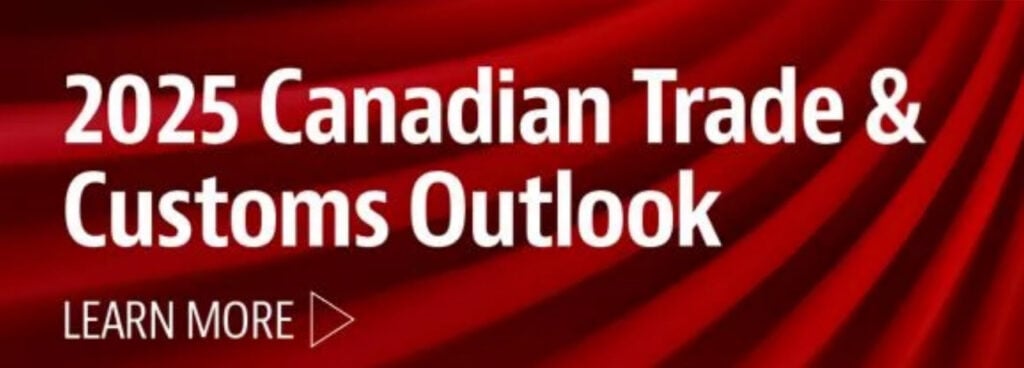Baker McKenzie’s Canadian international trade and customs team is publishing a series of articles reviewing 2024 trade and customs compliance developments and looking ahead to 2025’s burgeoning issues. This article focuses on Canadian legislative and enforcement developments in combatting forced and child labour.
Before we dive into Canada’s commitments to combatting forced and child labour, here is an overview of the current state of politics in Canada, which includes a discussion of the legislative powers that remain while Canadian Parliament is prorogued until March 24, 2025.
(Click the image to play the video)

2024 marked the first reporting year under Canada’s Fighting Against Forced Labour and Child Labour in Supply Chains Act (the “Supply Chains Act“), the first reports of enforcement of Canada’s import prohibition on goods mined/manufactured with forced or child labour pursuant to the Customs Tariff, and the first conclusions, terminations, and withdrawals of complaints to the Canadian Ombudsperson for Responsible Enterprise (“CORE“). The year ended with ambitious statements by the governing Liberal Party on proposed legislation to eradicate forced and child labour in Canadian supply chains.
In 2025, we expect that legislative developments and enforcement of existing legislation regarding the eradication of forced and child labour in Canadian supply chains will largely depend on the outcome of the Parliamentary pause (until March 24, 2024) and whether the Liberal Party will win a possible spring election. It remains unclear whether the Liberal Party’s current ambitions to establish supply chain due diligence legislation, ramp up enforcement of the import prohibition, and provide legislative authority for a rebuttable presumption on goods being manufactured with forced or child labour would remain a priority for Parliament with a different governing party.
Despite this uncertainty Canadian businesses can prepare for advancements in supply chain regulation as follows:
- Take advantage of filing consolidated global reports in jurisdictions where supply chain reporting requirements are in force. This will allow reporting entities to align and streamline public statements regarding supply chain compliance efforts across jurisdictions.
- Be mindful of the interplay between other areas of law, such as international sanctions, with human rights. We expect that Canada will continue to impose sanctions on nationals of countries facing allegations of human rights abuses, like forced and child labour.
- Follow elected officials’ statements regarding the introduction of proposed positive due diligence legislation, or perhaps the introduction of regulations under existing legislation. If the introduction of the Supply Chains Act is a worthy precedent, there are likely to be many questions on the application of any future law to Canadian and foreign organizations.
- Importers should stay attuned to whether Bill S-204, the Xinjiang Manufactured Goods Importation Prohibition Act, is reintroduced or reinstated during a new session of Parliament, or whether there will be proposed legislative amendments to the Customs Tariff introduced in the next federal budget implementation bill in respect of a rebuttable presumption.
- Undertake a mock audit of customs documentation to assess whether a business is prepared to respond to a Notice of Detention on the basis that goods are mined or manufactured with forced or child labour.
Canada’s Import prohibition on goods mined/manufactured with forced or child labour
Since July 1, 2020, Canada has prohibited the importation of goods mined or manufactured by forced labour under the Customs Tariff. The import prohibition was expanded to apply to goods mined or manufactured by child labour with the coming into force of Bill S-211, An Act to enact the Fighting Against Forced Labour and Child Labour in Supply Chains Act and to amend the Customs Tariff on January 1, 2024. Draft revisions to the Canada Border Services Agency (“CBSA“) policy on the import prohibition were circulated in Fall 2023; however, the current CBSA policy has yet to be updated and remains under review.
Although some imports have been detained and investigated by the CBSA on the suspicion of forced or child labour, the CBSA has not released statistics regarding its enforcement of this import prohibition. Canada has drawn scrutiny regarding its scant enforcement of the import prohibition from US Members of Congress, whom have not only urged cooperation under the forced labour provisions of the United States-Mexico-Canada Agreement (“USMCA“), but suggested that forced labour be discussed during the USMCA joint review scheduled for July 2026. The comments from US Members of Congress focus on the reported diversion of goods denied entry into the US being imported into Canada followed by an attempt to re-export the same goods into the US, and the lack of a rebuttable presumption under Canadian and Mexican law to establish a burden of proof on importers to prove that their supply chains are free of forced/child labour.
While there has been an uptick in CBSA enforcement of the import prohibition throughout 2024, the numbers remain weak as compared to the billions of dollars of goods detained by the United States Customs and Border Protection to date. To date, the CBSA has only found that one shipment has violated the import prohibition. The CBSA is now facing a lawsuit in Canada’s Federal Court following its detention of approximately 50 shipments of Chinese solar modules from the same importer, worth over CAD 5 million. This lawsuit provides some insight into the CBSA’s process for detaining and assessing goods that it suspects are produced with forced or child labour, despite the lack of guidance.
In this case, the CBSA issued Notices of Detention to the importer and requested information and documents from the importer to determine if the goods were manufactured or produced with forced labour. The goods were detained from February 2024 to April 2024 and ultimately granted customs clearance and were released between June 2024 and July 2024. The importer now alleges that the CBSA’s failure to timely consider their documents and wrongfully delay the release of the goods caused significant financial losses. The importer seeks damages and a declaration of wrongful conduct, including a finding that the CBSA violated their duty of care.
The CBSA last publicly addressed its enforcement process regarding the import prohibition on goods mined, manufactured or produced wholly or in part by forced or child labour in Fall 2023. For more details on the CBSA’s comments to industry concerning its forced and child labour import prohibition plans, read Baker McKenzie’s client alert here.
Supply Chains Act enters second reporting cycle
The next reporting period under Canada’s supply chain transparency legislation, the Supply Chains Act, is now open. New guidance was issued in November 2024 by Public Safety Canada that addressed interpretive issues, such as whether the parent corporations of reporting entities are required to report by virtue of controlling a reporting entity. Public Safety Canada clarified the following reporting requirements in the new guidance: having assets in Canada (a criteria to be a reporting entity under the Supply Chains Act) refers to tangible property in Canada, so the Supply Chains Act does not extend to companies producing only intangible goods, such as software services and insurance services.
Consequently, Canadian shareholdings alone are not sufficient to require an international parent company to report under the Supply Chains Act; and distribution and sales activities alone do not impose a reporting obligation on a company. Our November 2024 article details the key updates to reporting requirements contained in the guidance, as well as Public Safety Canada’s first annual report on the Supply Chains Act.
The first reports from the initial filing year are available on this portal and Public Safety Canada’s first report to Parliament on the initial filing year under the Supply Chains Act is available here. Although Public Safety Canada accepted late reports in the initial filing year, reporting entities may not be able to take advantage of the same enforcement leniency for the May 31, 2025 filing deadline.
In 2025, we expect more reporting entities to file “global” supply chain reports, taking advantage of the efficiencies noted in the official guidance, that entities may use the “same report produced for other jurisdictions” if all reporting requirements of the Supply Chains Act are included and the report covers the correct reporting period. However, reporting entities should also be mindful that the programs and policies described in a “global” report also apply to the reporting entity under the Supply Chains Act, or alternatively the “global” report should make clear what programmes/policies apply to the Canadian reporting entity/ies.
Commitments to enact positive due diligence legislation
The Government of Canada’s policy commitments in Budget 2023 and Budget 2024 included the introduction of new legislation aimed at eradicating forced labour from Canadian supply chains and strengthening the import ban on goods produced using forced labour by the end of 2024. The 2024 Fall Economic Statement (the “2024 FES“) previewed that new legislation would establish supply chain due diligence obligations. This regime would require government entities and businesses to scrutinize their international supply chains for potential violations and risks to fundamental labour rights, and to implement measures to address these risks.
The Government’s commitments follow established human rights due diligence legislation implemented in France, Germany and the soon to follow Corporate Sustainability Due Diligence Directive (“CS3D“) in the EU, which may provide a legislative road map for Canada. For example:
- France: The Duty of Vigilance Law (Loi de Vigilance) requires certain French businesses to publish a vigilance plan on the human and environmental risks of their activities, including within their subsidiaries, suppliers and subcontractors. It has been in force since 2017 and has an active enforcement record, with the first prosecution completed in 2023 (Baker McKenzie writes about it here) providing important take-aways on risk mapping, assessment tools, actions to mitigate risk, and the implementation of monitoring systems.
- Germany: The Act on Corporate Due Diligence Obligations in Supply Chains (Lieferkettensorgfaltspflichtengesetz) was enacted in January 2023 (Baker McKenzie writes about it here) and requires certain companies to enact human rights and environmental due diligence obligations in the supply chain. The required measures include the following: implementing a risk management system, appointing a human rights officer, undertaking risk analysis, adopting and communicating policies, establishing preventative measures, engaging in remedial actions where appropriate, establishing a complaints procedure, and risk-related due diligence measures with regard to indirect suppliers.
- EU: CS3D was provisionally agreed at a political level in December 2023, and confirmed by the COREPER in a revised version in March 2024 (Baker McKenzie writes about it here). In addition to an EU-forced labour ban which will apply as of December 2027 (Baker McKenzie writes about it here), the CS3D will require certain entities to adopt and implement effective due diligence policies for identifying, preventing, mitigating and bringing to an end actual and potential human rights and environmental harms in their own operations, those of subsidiaries and of their business partners relating to their “chain of activities”.
Canada may also look to the enumerated subject matters for mandatory reporting under the Supply Chains Act (e.g. policy implementing, training, remediation measures) as a guide to the obligations certain entities may have under Canadian law. In order to enforce the growing focus on the eradication of forced and child labour, the Government proposed the creation of a new oversight agency to ensure ongoing compliance with Canada’s forced and child labour initiatives.
Foreshadowing the establishment of a rebuttable presumption
The 2024 FES also announced the Government’s intention to strengthen Canada’s import prohibition on goods mined/manufactured with forced or child labour by introducing legislative amendments, which will require importers to demonstrate that their supply chains are free of forced and child labour, shifting the burden of proof onto importers. This commitment directly addresses the suggestions proposed by US Members of Congress on the use of rebuttable presumptions to root out goods produced with forced or child labour.
Using Canadian courts, public interest groups have attempted to establish a presumptive determination that goods imported from certain regions are made with forced labour, and are therefore prohibited from import into Canada under the Customs Tariff, subject to evidence otherwise. However, the Federal Court held that the CBSA does not have the legislative authority to impose such a presumption determination.
Accordingly, the Government may seek to introduce amendments to the Customs Tariff that grant the necessary authority to impose presumptive determinations (relying on a similar legal standard to the rebuttable presumption in the US Uyghur Forced Labour Prevention Act), or by championing Bill S-204, An Act to amend the Customs Tariff (goods from Xinjiang), which seeks to enact such a rebuttal presumption. However, this Bill has not advanced in Parliament since Spring 2022 and there is no clear indication of whether this will become law. Given that Parliament was prorogued by Prime Minister Justin Trudeau in early January, Bill S-204 must be re-introduced to Parliament or reinstated at the start of the new session.
The Canadian Ombudsperson for Responsible Enterprise
The CORE was established in April 2019 to address human rights abuses and ethical violations by Canadian companies operating abroad, particularly in the mining, oil and gas, and garment sectors. The CORE’s first “final report” was published in March 2024, which found misconduct by a Canadian mining company abroad. The first Ombud’s term ended in May 2024 and a new interim Ombud, Masud Husain, was announced. To date the CORE has not published a Q2 report on its ongoing operations in 2024. The last report (re Q1) was published on April 15, 2024, prior to Ombud Meyerhoffer’s departure. Recently, the CORE has terminated a review and withdrawn the accompanying complaint and has closed an investigation without any recommended follow-up.
The Government of Canada has indicated plans to undertake a review of the CORE in the near future. The proposal in the 2024 FES for a new oversight agency focused on forced labour may suggest that the CORE could either be replaced or integrated into this newly established entity. There remains an open question concerning the fate of unresolved cases currently under the CORE’s review. It is uncertain whether these cases would be transitioned to any new future agency or if they will be terminated/closed by the CORE.






